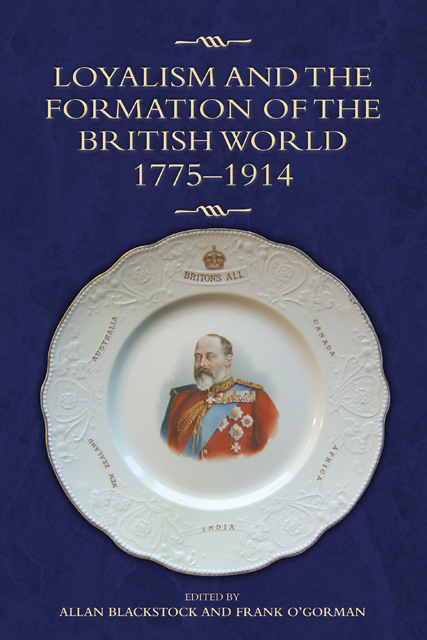Book contents
- Frontmatter
- Contents
- Notes on Contributors
- 1 Loyalism and the British World: Overviews, Themes and Linkages
- 2 Origins and Trajectories of Loyalism in England, 1580–1840
- 3 The ‘Spirit of Loyalty’: Material Culture, Space and the Construction of an English Loyalist Memory, 1790–1840
- 4 Anti-Catholicism and Orange Loyalism in Nineteenth-Century Britain
- 5 Loyalty and the Monarchy in Ireland, c.1660–c.1840
- 6 The Trajectories of Loyalty and Loyalism in Ireland, 1793–1849
- 7 Presbyterians, Loyalty and Orangeism in Nineteenth-Century Ulster
- 8 Unionists and Patriots: James Whiteside, the Irish Bar and the Dilemmas of the Protestant Nation in Victorian Ireland
- 9 Loyalism in British North America in the Age of Revolution, c.1775–1812
- 10 ‘A Colonial Hybrid’: Nineteenth-Century Loyalism as Articulated by the Orange Order in the Maritime Colonies of British North America
- 11 Canadian Catholics, Loyalty, and the British Empire, 1763–1901
- 12 Loyalism in Australasia, 1788–1868
- 13 ‘We love one country, one queen, one flag’: Loyalism in Early Colonial New Zealand, 1840–80
- 14 Clientelism, Community and Collaboration: Loyalism in Nineteenth-Century Colonial India
- Select bibliography
- Index
9 - Loyalism in British North America in the Age of Revolution, c.1775–1812
Published online by Cambridge University Press: 28 February 2023
- Frontmatter
- Contents
- Notes on Contributors
- 1 Loyalism and the British World: Overviews, Themes and Linkages
- 2 Origins and Trajectories of Loyalism in England, 1580–1840
- 3 The ‘Spirit of Loyalty’: Material Culture, Space and the Construction of an English Loyalist Memory, 1790–1840
- 4 Anti-Catholicism and Orange Loyalism in Nineteenth-Century Britain
- 5 Loyalty and the Monarchy in Ireland, c.1660–c.1840
- 6 The Trajectories of Loyalty and Loyalism in Ireland, 1793–1849
- 7 Presbyterians, Loyalty and Orangeism in Nineteenth-Century Ulster
- 8 Unionists and Patriots: James Whiteside, the Irish Bar and the Dilemmas of the Protestant Nation in Victorian Ireland
- 9 Loyalism in British North America in the Age of Revolution, c.1775–1812
- 10 ‘A Colonial Hybrid’: Nineteenth-Century Loyalism as Articulated by the Orange Order in the Maritime Colonies of British North America
- 11 Canadian Catholics, Loyalty, and the British Empire, 1763–1901
- 12 Loyalism in Australasia, 1788–1868
- 13 ‘We love one country, one queen, one flag’: Loyalism in Early Colonial New Zealand, 1840–80
- 14 Clientelism, Community and Collaboration: Loyalism in Nineteenth-Century Colonial India
- Select bibliography
- Index
Summary
When considering the role of loyalism in British North America during what is sometimes termed the ‘age of revolution’ it is crucial at the outset to clarify precisely what the central political currents and directions actually were in the wider late eighteenth- and early nineteenth-century Atlantic world. This task is all the more pressing because of the long shadow that R. R. Palmer’s notion of ‘democratic revolution’ has cast over the historiography. While this concept has certainly proven influential over the years, it is now becoming increasingly clear that the label is, especially in its purest form, rather limited, misleading, and simplistic. The basic problem is that it posits an inevitable progression from European empires to nation-states following the emergence of supposed democratic forces – nationhood invariably being seen as the appropriate, indeed the only, vehicle through which democracy could attain full realisation. Recently, however, scholars like Jeremy Adelman and Jaime Rodriguez O., writing from the perspective of the Iberian Atlantic, have challenged this underlying premise. They have attempted to liberate the fraught passage from empires to successor states from the straitjacket of these blatantly one-dimensional teleologies of decline and triumph. Instead, Adelman and Rodriquez have suggested that, because their systems were more adaptable and less sclerotic than previously thought, there was little that was inevitable about the demise of early modern empires. Moreover, the upheavals that took place beginning in the late eighteenth century were actually themselves essentially imperial in character in that they had their origins in an Atlantic-wide drive to put the ‘extended polities’ of these empires on a firmer footing in order to confront external pressures and challenges more effectively. Hence, according to Adelman and Rodriguez, it is a mistake to see these Atlantic revolutions as purely secessionist episodes; they were more far complex and less straightforward than that designation implies. Instead new nations emerged almost as accidental by-products of the internal tensions wrought by these wider efforts to revamp the institutional underpinnings of imperial sovereignty and, as a result, the states that developed were shaped profoundly by the enduring legacies of empire and colonialism.
These authors’ important revisionist arguments clearly signal a rather different approach to the transition from Atlantic empires to nation-states from that suggested by Palmer’s concept of the ‘age of democratic revolution’. They raise the interesting prospect of non-linear historical sequences and the possibility of reversals and backslidings.
- Type
- Chapter
- Information
- Loyalism and the Formation of the British World, 1775-1914 , pp. 163 - 180Publisher: Boydell & BrewerPrint publication year: 2014
- 1
- Cited by

